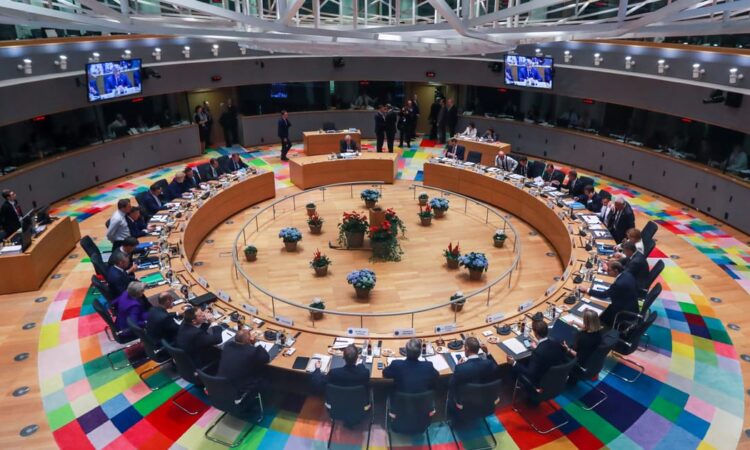
Press play to listen to this article
Voiced by artificial intelligence.
Alberto Alemanno is the Jean Monnet Professor of European Union Law at HEC Paris and founder of The Good Lobby, a nonprofit committed to equalize access to power.
Prime Minister Viktor Orbán, the longest-serving current leader of any European Union member country, has turned Hungary into an “electoral autocracy” that can no longer be considered a “functioning democracy.” And yet, Hungary is due to take over the rotating presidency of the Council of the EU in late 2024.
As this may lead the bloc into unknown territory, the mere prospect of Hungary’s impending presidency raises a legitimate yet uncomfortable question: How can an EU member country — like Hungary or Poland — which has been found in breach of fundamental EU values multiple times and had its funds suspended, credibly chair one of the main EU institutions?
The presidency gives its holder the power to set the Council of the EU’s agenda by chairing virtually all meetings taking place among the EU’s 27 ministers, and representing the Council in relations with the other institutions. Any government holding the presidency is expected to act as an “honest broker” for the 27 member countries.
Thus, one may wonder how a government subject to the Article 7 procedure for systemically disregarding the EU’s fundamental values, and with its EU funds suspended, could chair Council meetings set to address those very same issues. In addition, Budapest’s less than forthright support of Ukraine — to say the least — further raises the stakes for the entire bloc.
The possibility of suspending the rotating presidency of a member country is something that has remained confined to academic speculation for a long time. Yet, with the European Parliament now calling on EU leaders to block Hungary’s presidency by a large majority, today it appears more likely than ever before.
To this end, several options to alter the incoming rotating presidency of a member country already exist.
One option is that, by a qualified majority vote, all EU member countries change the order of the nations set to hold the presidency. This may then push Hungary’s entitlement to hold the presidency to an undetermined date, until it has come back into the fold of binding EU norms.
An alternative route may be for the two governments holding the next two presidencies before Hungary — that’s Belgium and Spain within the so-called trio system — to amend their internal arrangements and alter the agenda of Hungary’s presidency. As a result, all Council meetings involving rule of law (such as Article 7, the suspension of EU funds, compliance with super milestones, etc.) could then be overseen by other governments instead. However, this would go down in history as the Council’s first depleted presidency.
Finally, yet another option could entail a full suspension of Hungary’s presidency, with Belgium and Spain taking half of Hungary’s six months each, resulting in their respective rotations lasting nine months.
Considering Hungary’s presidency is set to start after the next EU Parliament election, this case for postponement, or suspension, is unlikely to go away anytime soon, but rather gain even more political momentum. And this is even more probable when taking into consideration that the following presidency is due to be held by Poland — another rebellious member country, the presidency of which would raise many of the same problems, although not when it comes to Ukraine.
Thus, EU leaders at the Council must now respond to the Parliament’s call “to find a proper solution as soon as possible.” And unless they do so, the Parliament has threatened to take “appropriate measures,” such as boycotting the operation of Hungary’s forthcoming presidency by reducing cooperation to a bare minimum.
The prospect of such a stalemate should also help President Ursula von der Leyen’s European Commission realize it cannot fulfill its agenda, if the leadership of one of its fellow institutions is in the hands of a member country it has blocked from receiving millions of euros in EU funds on rule-of-law grounds.
In the meantime, the German, Dutch and Swedish governments have unexpectedly already expressed some public support for this idea, with Germany’s Minister of State for Europe Anna Lührmann saying, “I have doubts about the extent to which Hungary can succeed in holding a successful presidency.” The same goes for Belgium, Denmark and Cyprus — all set to share the presidency in the same year as either Hungary or Poland — as their own reputations are very much on the line, considering they may be judged as accomplices to the first rebellious Council presidencies in the bloc’s history.
Regardless of whether Hungary’s — and then Poland’s — presidency will eventually be suspended, however, the mere reality of contemplating such a possibility expands the options available to Brussels, so that it can nudge rebellious countries to comply with their obligations under EU law.
The hostile reactions by the Hungarian and Polish governments suggest they are both very sensitive toward this major challenge to their international reputation. And, in turn, this indicates that simply the threat of impeding the Council presidency of a rebellious member may prove to be one of the most effective instruments for Brussels to make the likes of Hungary fall in line.
Ultimately, blocking Hungary’s presidency isn’t about sanctioning Orbán — it’s about preserving the bloc’s operation and good governance. As such, this unprecedented threat to Hungary — and Poland — looks set to prompt a long overdue political and legal debate over whether, and for how long, the EU can tolerate governments that incessantly challenge the bloc’s authority while continuing to benefit from its status and funding.






